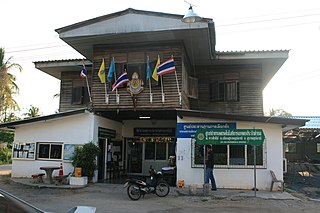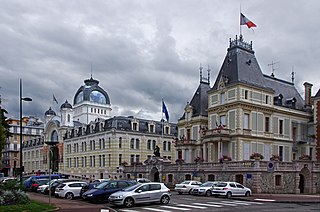A county is a geographic region of a country used for administrative or other purposes in some nations. The term is derived from the Old French comté denoting a jurisdiction under the sovereignty of a count (earl) or a viscount. Literal equivalents in other languages, derived from the equivalent of "count", are now seldom used officially, including comté, contea, contado, comtat, condado, Grafschaft, graafschap, and zhupa in Slavic languages; terms equivalent to 'commune' or 'community' are now often instead used.

Local government is a generic term for the lowest tiers of governance or public administration within a particular sovereign state.

A district is a type of administrative division that in some countries is managed by the local government. Across the world, areas known as "districts" vary greatly in size, spanning regions or counties, several municipalities, subdivisions of municipalities, school district, or political district.

Portugal is a unitary state with delegated authority to three levels of local government that cover the entire country:

Eyalets, also known as beylerbeyliks or pashaliks, were the primary administrative divisions of the Ottoman Empire.

Tambon is a local governmental unit in Thailand. Below district (amphoe) and province (changwat), they form the third administrative subdivision level. As of 2016 there were 7,255 tambons, not including the 180 khwaeng of Bangkok, which are set at the same administrative level, thus every district contains eight to ten tambon. Tambon is usually translated as "township" or "subdistrict" in English — the latter is the recommended translation, though also often used for king amphoe, the designation for a subdistrict acting as a branch of the parent district. Tambon are further subdivided into 69,307 villages (muban), about ten per tambon. Tambon within cities or towns are not subdivided into villages, but may have less formal communities called chumchon that may be formed into community associations.
Political unitarism designates various theories, concepts or policies that advocate or enforce a fully unified and centralized system of government, with ultimate goal in creating a unitary state. In practice, unitarism is often manifested as a political doctrine or movement within complex political entities, advocating for the highest degree of political integration and unification, beyond mere administrative centralization.

An oblast in Ukraine, sometimes translated as region or province, is the main type of first-level administrative division of the country. Ukraine's territory is divided into 24 oblasts, as well as one autonomous republic and two cities with special status. Ukraine is a unitary state, thus the oblasts do not have much legal scope of competence other than that which is established in the Ukrainian Constitution and devolved by law. Articles 140–146 of Chapter XI of the constitution deal directly with local authorities and their competence.

An administrative centre is a seat of regional administration or local government, or a county town, or the place where the central administration of a commune is located.
The municipalities of Greece are the lowest level of government within the organizational structure of the state. As of 2021, there are 332 municipalities, further divided into 1036 municipal units and 6136 communities. Thirteen administrative regions form the second-level unit of government. The regions consist of 74 regional units, which mostly correspond to the old prefectures. Regional units are then divided into municipalities. The new municipalities may be subdivided into municipal units, consisting of the pre-Kallikratis municipalities. These were further subdivided into municipal communities and local communities according to population, but are simply named communities since the entry into force of the Kleisthenis I Programme on 1 September 2019.

The Democratic Society Party was a Kurdish nationalist political party in Turkey. The party considered itself social-democratic and had observer status in the Socialist International. It was considered to be the successor of the Democratic People's Party (DEHAP). The party was established in 2005 and succeeded in getting elected more than ninety mayors in the municipal elections of 2009. On 11 December 2009, the Constitutional Court of Turkey banned the DTP, ruling that the party has become "focal point of activities against the indivisible unity of the state, the country and the nation". The ban has been widely criticized both by groups within Turkey and by several international organizations. The party was succeeded by the Peace and Democracy Party.

Egypt is divided, for the purpose of public administration, according to a three-layer hierarchy and some districts are further subdivided, creating an occasional fourth layer. It has a centralized system of local government officially called local administration as it is a branch of the Executive.
A province is almost always an administrative division within a country or state. The term derives from the ancient Roman provincia, which was the major territorial and administrative unit of the Roman Empire's territorial possessions outside Italy. The term province has since been adopted by many countries. In some countries with no actual provinces, "the provinces" is a metaphorical term meaning "outside the capital city".

Sri Lanka is divided into 9 provinces, which are further subdivided into 25 districts. Districts are further subdivided into Divisional Secretary's Divisions. Each DS Division is divided into Grama Niladhari Divisions.

The Republic of Cameroon is a decentralized unitary state.

Government in Spain is divided into three spheres or levels: the State itself, the regions or autonomous communities and local entities. These levels are not hierarchical, meaning there is no supremacy or primacy of one over the other, but rather they are separately defined by their jurisdictional powers.
The Peruvian State, which is conceptually the Peruvian nation legally organized, is the entity that holds the government in the Republic of Peru. The state's structure is defined in the Constitution of Peru approved by referendum and promulgated in late 1993 and in force since January 1, 1994.

The federalization of Syria has been controversially proposed as a possible solution to end the Syrian Civil War. In the broadest sense, it means turning the centralized Syrian Arab Republic into a federal republic with autonomous subdivisions. Many powers and actors involved in the Syrian Civil War have entertained the idea of "federal division", not least among them Russia, United Nations representatives, the United States and Israel. Bashar al-Assad has publicly rejected the idea of federalism, asserting that the Arab majority in Syria is opposed to such proposals. Most of the neighbouring countries in the region have also dismissed the proposal, including the members of the Arab League and Turkey.

The Turkish local elections of 2019 were held on Sunday 31 March 2019 throughout the 81 provinces of Turkey. A total of 30 metropolitan and 1,351 district municipal mayors, alongside 1,251 provincial and 20,500 municipal councillors were elected, in addition to numerous local non-partisan positions such as neighbourhood wardens (muhtars) and elderly people's councils.
Decentralisation in Thailand is a political decentralisation in Thailand since the 1990s, caused by the democratic movement. The Thai Constitution of 1997 and decentralisation law of 1999 started an official reform process, but from 2001 to 2010, both the Thaksin governments and the military junta tried to recentralise the bureaucratic system under the CEO-style management and military sanction. In the 2014 coup, a reform process had been frozen from the military-dominated politics.

















